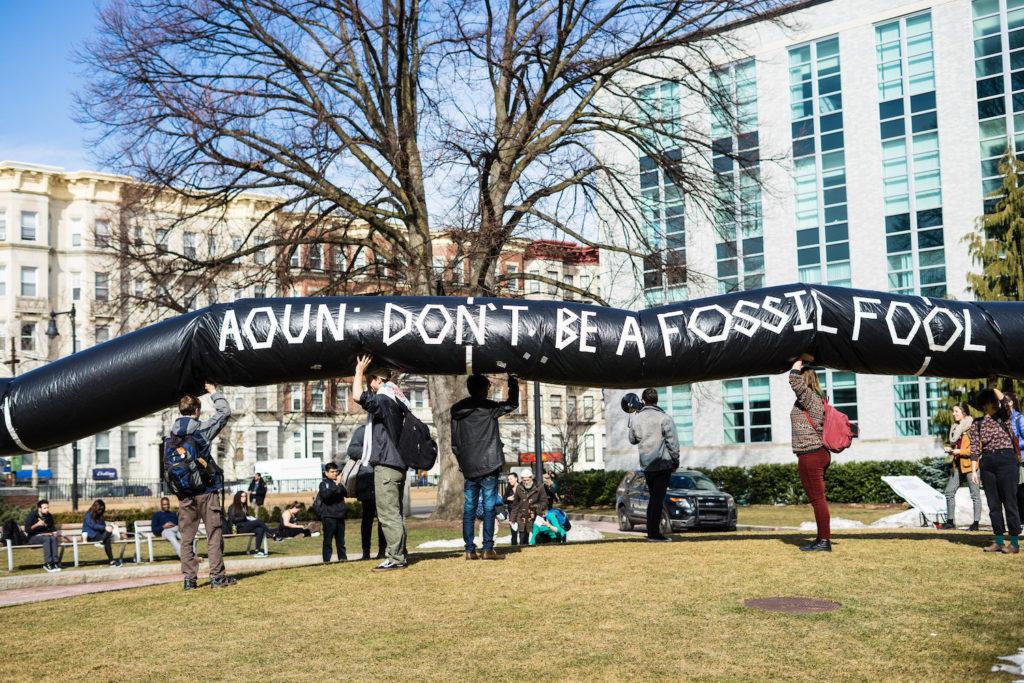Editorial: Paradise Papers should be a catalyst for change
Students protest Northeastern’s investment in fossil fuel companies on Kretzman in 2017. DivestNU has been advocating for divestment for years. photo by lauren scornavacca
November 16, 2017
Last Wednesday, The Guardian published an article about the Paradise Papers, a collection of leaked documents that revealed Northeastern was on a list of 12 U.S. universities that had invested part of their endowments in fossil fuels using an offshore hedge fund.
The report was no doubt unwelcome media scrutiny for the administration, but not a new topic for The News or the Northeastern community. The issue of divesting the university’s endowment from fossil fuels has been a hot-button issue in past semesters with student activist group DivestNU leading the cause.
Last year, as part of a report on DivestNU’s occupation on Centennial Common, The News reached out to the university for comment on the sit-in. In an email response, director of communications Matthew McDonald stated, “The university does not hold any direct investments in energy companies, due in part to the fact that endowments of this size rely primarily on commingled investment funds that include investments from a broad range of economic sectors.”
Northeastern can no longer avoid being in the spotlight for their ties to the fossil fuel industry and with the attention now on them, it is time the university made real steps to address this issue.
Northeastern and the 11 other universities on the list have invested an undisclosed amount of money in EnCap Energy Capital Fund IX-C. The fund is based in the Cayman Islands where there is no corporate or income tax. The money invested there is funneled to Texas-based fossil fuel venture capital firm EnCap Investments. According to The Guardian, over the past three decades, the firm has invested more than $20 billion into fossil fuel exploration and production.
The university responded to the Paradise Papers in a statement that read, “Northeastern University’s endowment is invested to maximize opportunities for advancing our educational and research mission. It is important that we diversify our portfolio to enhance the return on these investments within the strict guidelines of the law. Consistent with other mission-driven institutions, the university maintains some limited investments in offshore entities.”
Commingled funds are not direct investments but the university has been hiding behind technicalities. It is unclear how much of the endowment is invested in EnCap or if the university currently has other offshore investments. These questions aren’t answered by the university’s statement. It is time the university takes seriously and openly addresses the requests of the activist groups on campus because, in the end, they were right about what the administration was hiding.
How can the university claim they use the endowment to create better learning experiences for students when those very students organize protests, hang condemning posters and march to offices to demand the university be conscientious with their investments? What’s more, the university cannot claim to be globally-minded or looking toward the future while they actively contribute to something that is impacting our planet so negatively and will no doubt be a burden to future generations.
DivestNU is not alone in their concern over fossil fuel investments. They’ve been backed by the Student Government Association. Last semester SGA reaffirmed them with a student call for the university to divest from any direct and indirect ties to the fossil fuel industry. SGA emphasized their desire for the university to be more transparent about their investments. Members of the Faculty Senate also support more transparency from the university and recently passed a resolution asking this of the university. Most of the Senators have expressed interest in passing a resolution similar to one DivestNU previously proposed to them. A path to divestment was drawn up and approved unanimously by the Senate.
Northeastern is not required to follow through on these resolutions but The News believes it is time the the administration finally start listening to the people they should be answering to: the student body. While they claim they are dedicated to sustainability, they have not stated they will accept any student proposals. To ignore this would be to ignore the wishes of both students and faculty. The administration may feel justified in doing this, but if the leak of the Paradise Papers has shown us anything, it is that the university may try but it cannot hide.
Photo courtesy Lauren Scornavacca







